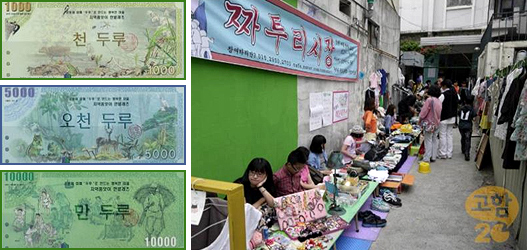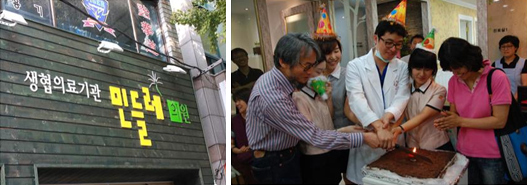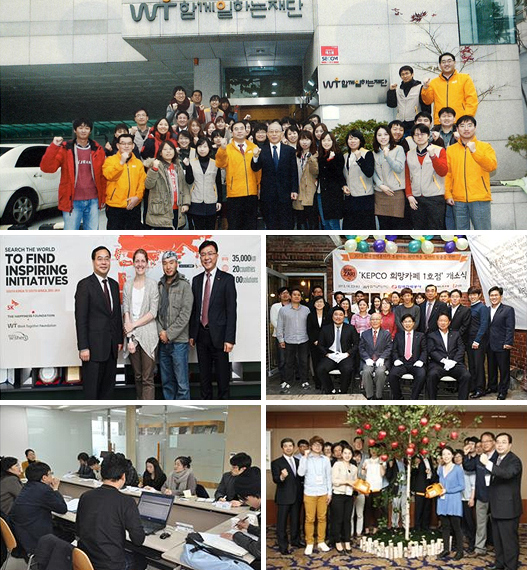Social Enterprise Tour

The registration for the Social Enterprise Tour is closed.
We deeply appreciate for your supports and interests in this program.
We hope to see you soon in Korea!

SITE A (1 Night 2 Days) : $300* October 12~13, 2014
* This fee includes: the transportation between The K-Hotel and destinations including CB Center; lunch, dinner and accommodation for October 12; and breakfast and lunch on October 13. If you wish to stay at The K-Hotel for the evening of October 11 or 13 in addition to this tour package, we have negotiated preferential rates with the hotel for you. Please contact the hotel for more information on the preferential rates at reservation@thek-hotel.co.kr.All study tour presentations and workshops will be conducted in Korean and an English interpretation will be provided.
| Oct. 12 (Sun.) |
Time
(duration in minutes) |
Itinerary |
09:00 – 12:00
(180 min.) |
Departure from the K-Hotel, Seoul to Wanju-gun
(The K-Hotel website : www.thek-hotel.co.kr) |
12:00 – 13:30
(90 min.) |
Visit to Wanju-gun Community Business Center (CB Center)
ŌØÜ What you will learn and see :
- Information on the operation of social enterprises that represent the characteristics of communities and regions they operate in.
ŌØÜ Description of the site :
CB Center aims at reviving the local community by using the local resources, including businesses and labour, continuously funneling profits back into the local community, creating a sustainable community environment. So far, the project has created over 1,000 jobs and helped 100 community enterprises to become sustainable.
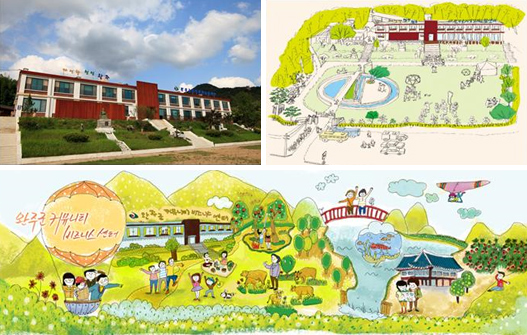
Note
* Lunch at Jahara (Korean food restaurant)
* Website : www.wanjucb.org
|
13:30 – 14:00
(30 min.) |
Move to the next site |
14:00 – 14:50
(50 min.) |
Appropriate Technology Socialcoop and School of UNESCO Chair Earthen Architecture in Korea
ŌØÜ What you will learn and see :
- The social enterprise in action!
ŌØÜ Description of the site :
<Transitiontech Socialcoop>
The Korean Appropriate Technology experts gathered to establish Transitiontech Socialcoop, a research institute for energy transformation, to transform climate change, energy crisis, depletion of resources and food into eco-oriented, sustainable society, to build self-sustaining local economy and to spread Appropriate Technology for energy transformation. Transitiontech Socialcoop is engaged in the research and development of Appropriate Technology, training of experts and public, etc.

<School of UNESCO Chair Earthen Architecture in Korea>
School of UNESCO Chair Earthen Architecture in Korea (hereafter, the ŌĆ£SchoolŌĆØ) has been conducting earthen architecture training as a part of the UNESCO Chair Program. In 2013, the School was opened as Wanju-gun Office in Jeonbuk Province and Terrakorea entered into a cooperation agreement. The School aims at conducting architectural training that reflects the local characteristics and training the experts and craftsmen who will continue to realize the social and ecological architecture that represents the local characteristics by conducting the technical training on the materials and methods of earth architecture and the customized Appropriate Technology training for consumers from all walk of life. 
|
14:50 – 15:10
(20 min.) |
Move to the next site |
15:10 – 16:00
(50 min.) |
Visit to Yongjin Agricultural Cooperative
ŌØÜ What you will learn and see :
- Emerging business model in social economy in Korea
- Shedding light on the local food business
ŌØÜ Description of the site :
The Youngjin Agricultural Cooperative Direct Sale Market, opened in April 2012, brings together producers and consumers in Wanju area. Wanju-gun in Jeonbuk province was the first in Korea to have adopted a local food movement into administrative policy in 2008. The 10% of sales profit is reinvested into the local food direct sales market, after deducting minimal expenses, such as the wages and management fees. The local farming householdsŌĆÖ actual incomes have increased, as they received fair prices for their hard work by trading in the local food direct sales market, which eliminated the costs from the layers of distributors. The stable sales channel helped the farming activities of the farming households to become more sustainable, creating virtuous cycle in the local economy.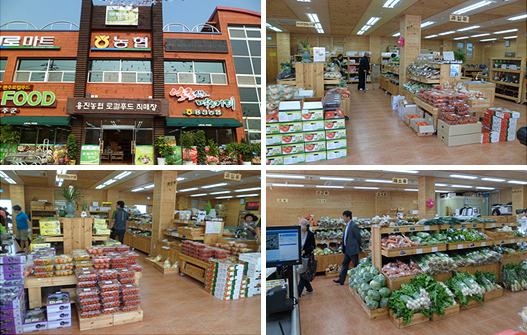
|
16:00 – 16:20
(20 min.) |
Move to Jeon-ju |
16:20 – 18:00
(100 min.) |
Visit to Jeon-ju Hanok Village and social enterprise, Sooeul
ŌØÜ What you will learn, experience and see :
- Korean traditional houses
- Korean traditional brewery
ŌØÜ Description of the site :
<Jeon-ju Hanok Village>
Jeonju Hanok Village has 700 Hanoks, the traditional Korean houses, that are still homes to residents today. The Hanok Village in Jeon-ju is KoreaŌĆÖs best-preserved traditional village and one of the most popular tourist attractions in Korea. Jeonju also hosted the FIFA World Cup 2002, for which a grand scale refurbishments in many areas in the city were made for World Cup visitors.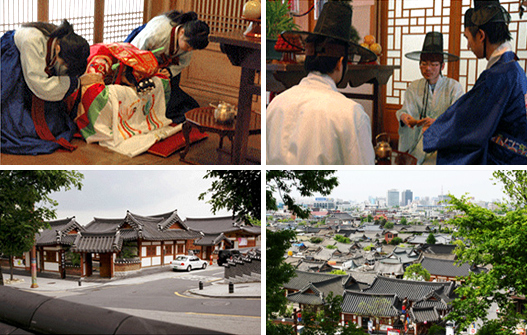
<Sooeul>
To keep alive the tradition of home-brewed liquor, which had faced the extinction under the liquor tax law during the Japanese colonization period, Koreans are researching and trying to revive their traditional liquors, training people in home-brewing, producing high-end Makgeolli, the rice wine, and developing a variety of cultural contents related to the traditional liquor. Sooeul operates the Jeonju Traditional Liquor Museum, the only Korean museum focused on the traditional home-brewed liquor, along with the Jeonju Traditional Liquor Education Center, at the Hanok Village in Jeonju.
Note
* Jeon-ju Hanok Village Website : http://tour.jeonju.go.kr
* Sooeul Website : www.urisul.kr
|
18:00 – 19:30
(90 min.) |
Dinner (Welcome Reception)
Venue : Kirin Hall, Hotel LE WIN (1F)
Menu : TBD
|
19:30 – 20:30
(60 min.) |
Check in to Hanok Village
Hotel : Hotel LE WIN (single occupancy) |
20:30 – 21:30
(60 min.) |
Hanok Village (night tour)
Note
* Personal option (accompanied by the tour staff)
|
| 21:30 - |
Back to hotel and rest |
| Oct. 13 (Mon.) |
Time
(duration in minutes) |
Itinerary |
08:00-09:00
(60 min.) |
Breakfast |
09:00-11:00
(120 min.) |
Move to Daejeon |
11:00-12:30
(90 min.) |
Visit to ‘Hanbat LETS’ and ‘Mindlle Medical Co-op’
ŌØÜ What you will learn and see :
- The local currency in circulation
- Sharing of cases from regional communities, such as the regional, cultural, and active models
ŌØÜ Description of the site :
<Hanbat LETS>
Hanbat LETS was founded in 2002, in the wake of the Asian Financial Crisis, as a community labour exchange program, where over 600 members transacted in the locally-recognized currency, ŌĆ£DuruŌĆØ. 1,000 ŌĆ£DuruŌĆØ is equal to KRW 1,000 or $1. In 2012, a total of 15,899 transactions were recorded at a value of 300,004,600 ŌĆ£DurusŌĆØ.
<Mindlle Medical Co-op>
Mindle Medical Co-op was founded by Hanbat LETS and Daejeon and Chungnam Association of Physicians for Humanism with the support from local organizations and residents, while adhering to the patientsŌĆÖ rights and ensuring democratic medical services participated by the community.
|
12:30-14:00
(60 min.) |
Lunch
|
14:00-17:00
(180 min.) |
Move to Hongik Univ. area |
17:00-18:00
(60 min.) |
Visit to Work Together Foundation (the host organization)
ŌØÜ What you will learn and see :
- Introduction to the Foundation, the host of SEWF, of which mission is to create jobs, and its visions.
ŌØÜ Description of the site :
The Work Together Foundation(ŌĆ£WTŌĆØ) is the leader of creating social jobs and supporting social enterprises. At the time of the Asian Foreign Currency Crisis, WT provided the living expense subsidies to 5,380,000 unemployed workers and their families, representing approximately ten percent of the population in Republic of Korea. WT also assisted the homeless in finding housing and jobs. WT conducted researches related to the unemployment and suggested policies to overcome the unemployment. WT also carries out many different projects, including campaigns and fund-raisers for social causes.
|
18:00-22:00
(240 min.) |
Dinner and Seoul night life exploration
ŌØÜ What you will learn and see :
- Hongik University area, the streets of youth and art! Feel one of the most happening places in Korea!
ŌØÜ Description of the site :
- The area around Hongik University (ŌĆ£HongdaeŌĆØ) Station is one of the most well-known neighborhoods in Seoul, which brings the youth together with the culture. The streets in front of Hongik University, filled with various restaurants, clubs, and clothing stores, are the popular destination among foreigners as a place where they can immerse themselves in Hallyu (the Korean wave) culture. As Korea’s oldest culture and arts district, the area hosts numerous and varied performances and exhibitions, affording the tourist a lot to see.
<photographs will be exhibited>
Note
* Free time after the dinner (accompanied by the tour staff)
|
18:00-19:00
(60 min.) |
Back to The-K Seoul Hotel |
SITE B (Day trip) : $100* October 14, 2014
* This fee includes: the transportation between The K-Hotel and the destinations and lunch on October 14. If you wish to stay at The K-Hotel for the evening of October 13, 14 or 15 in addition to this tour package, we have negotiated preferential rates with the hotel. Please contact the hotel for more information on the preferential rates at reservation@thek-hotel.co.kr.All study tour presentations and workshops will be conducted in Korean and an English interpretation will be provided.
| Oct. 14 (Tue.) |
Time
(duration in minutes) |
Itinerary |
08:00 – 09:00
(60 min.) |
Breakfast
Note
* For those staying at the hotel
|
09:00 – 10:00
(60 min.) |
Move to Mapo |
10:00 – 13:00
(60 min.) |
Visit the workshop at Seongmisan Village
ŌØÜ What you will learn and see :
- The case of residents who created an ŌĆśurban villageŌĆÖ by themselves, by engaging in a variety of community activities and running local enterprises
ŌØÜ Description of the site :
Seongmisan Village is home to the first co-op style day care center in Korea, established in 1994. Additional day care centers opened here. In 2000, 4 centers came together to create the ŌĆśMapo Dure Co-opŌĆÖ. In 2001, local residents protested against the development plans for Seongmisan Mountain, due to the planŌĆÖs environmental impact. The project was eventually cancelled in 2003, encouraging the residents to engage further in the community campaigns.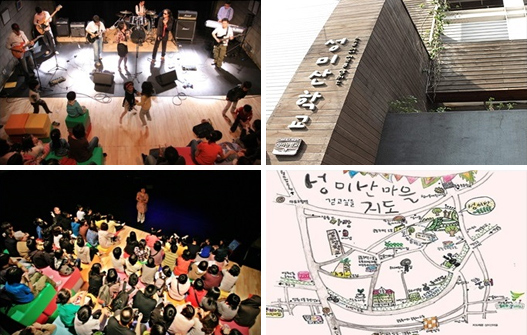
Note
* Lunch at Seongmisan’s Table
|
13:00 – 14:00
(60 min.) |
Move to Yangcheon |
14:00 – 15:30
(90 min.) |
Yangcheon-gu Incubation Center
ŌØÜ What you will learn and see :
- A tour of the incubation center and presentations from some of the social ventures on their works
ŌØÜ Description of the site :
Yangcheong-gu was the first municipality to establish a business incubation centre. The center boasts a number of spaces designed to encourage creativity and communication, where social ventures selected by the Korea Social Enterprise Promotion Agency are incubated. Here, social entrepreneurs have access to coaching, mentors, networking and back office support. The center successfully incubated 35 ventures in the first year and 28 in the following year.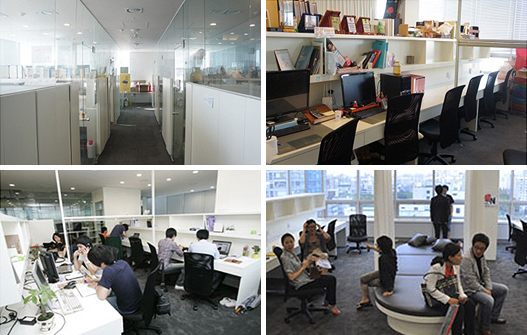
|
